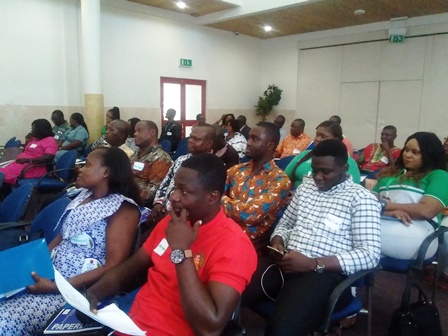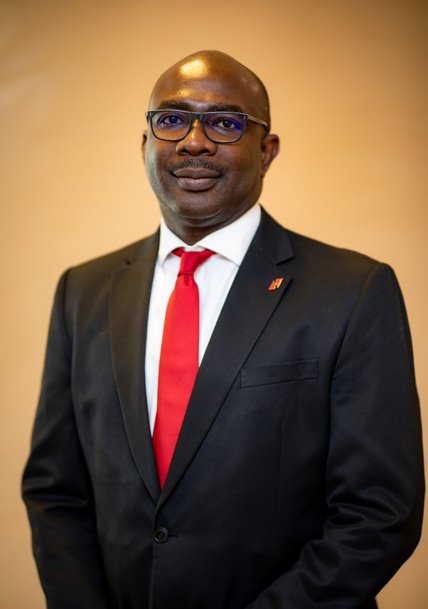Labour Unions Urged To Unite To End Modern-Day Slavery In The Work Space

Labour Unions across the globe have been urged to work together as a united front in bringing to an end modern day slavery that exists within the work and labor space.
The call was made at the Year of Return Labor Summit in Accra.
This year commemorates the 400th year of when enslaved Africans first touched the shores of America.
In commemorating the event, the National Association for the Advancement of Colored People (NAACP) along with the Coalition of Black Trade Unionists (CBTU), AFLCIO, the Solidarity Center, and the Trades Union Congress (TUC)-Ghana hosted a labor discussion to examine how past labor practices have current global impacts.
According to Terry Melvin, President of the Coalition of Black Trade Unionists (CBTU) the 400 years of enslaved Africans being one of the worse examples of forced labor in history, it sets a tone for how labor relations have been conducted over the years.
Addressing the forum, Terry Melvin trade unionists must begin to learn to come together to help each other so as to be able to create a world of work where employers will no longer oppress the employees.
“We must come together to see to it that yes, there is no more oppression, we will no longer allow people to under-educate us, that we equally have the right to good education, good healthcare, good wages for the work we do and that we have a voice in decision making process of the companies we work for,” he said.
Speaking on the Topic “History of the trans-Atlantic slave trade; the impact and the connection to the trends we see today,” Terry Melvin stressed that though Congress outlawed the African slave trade in 1808, domestic slave trade flourished leading to the increase in slave population in the United States.
According to him, in order to ensure the profitability of enslaved African people, and also to produce maximum return on investment, slave owners generally supplied only the minimum food and shelter needed for survival, and forced their slaves to work from sunrise to sunset.
“During the Civil War, roughly 180,000 black men served in the Union Army, and another 29,000 served in the Navy, Three-fifths of all black troops were former slaves,” he lamented.
Touching on Migration, he stated that unemployment has been a key driver of migration in Africa with youth unemployment being the driver of extra-continental migration from Northern Africa.
Terry Melvin also revealed that in 2016, the youth unemployment in Northern Africa stood at 29.3%, stressing that demands for labor in economic and other sectors are propelling African migration.
He said: “Today the issues for working people in the US and on the continent are happening for the same reason they did 400 years ago – greed and power. Globalization has wreaked havoc and we are all feeling the effects of it through the issues we see with migration and through the issues we see in global supply chains. People are working harder and getting paid less.”
Also, resident for the National Association for the Advancement of Colored People (NAACP), Derrick Johnson in his remarks averred that the agenda is strengthening the relationship between the people of Africa and especially Ghana, where they can work towards a stronger Africa diaspora that will ensure development and progress.
He said African labor cannot continue to be exploited hence the ability of workers to collectively bargain for the benefit of not only the workers, but companies they work for.
“We all know that it is the workers that make corporations successful, when workers are provided for in an equitable manner and their rights are respected, they work to grow the company. Inclusive workers voices also help organizations successful,” he said.
According to Derrick Johnson African labor has been exploited for free for over 400 years, and that the time has come for workers to unite across the globe and hold international labour organizations accountable.
He said the threat to exploit Black labor is still an unfortunate reality across the world, and the need to recognize the value and power of Black labor and consumerism.
He said: “We’re here to recognize the 400th year since the transatlantic slave trade. It’s important to note that we are recognizing it, not celebrating. You don’t celebrate a tragedy. And we cannot forget what that tragedy’s impact has had on our world.”
According to Derrick Johnson, there is the need to build a future in which the fights for labor rights and civil rights are one and the same.
“From the Civil War to the civil rights movement, the struggle for equality is inseparable from the fight for worker dignity,” said Johnson, He explained that without the effort to make sure that people could effectively bargain for their labor, there never would have been a civil rights movement.
Derrick Johnson called for an ever-stronger alliance between civil rights organizations like the NAACP and the labor movement to understand their role and relationship to labor
He said: “In every major world city there are people that look like me. In today’s political and economic climate, we must recognize that first we are Black, and for some, when they see a Black person, they only see a readily available source for cheap labor.”
By PROSPER AGBENYEGA




